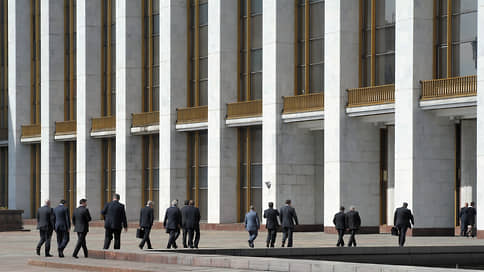Technologies counted – Newspaper Kommersant No. 67 (7512) dated 04/18/2023
[ad_1]

The White House, using the adopted technological taxonomy, has set priorities in this area for the coming years – we are talking about both the creation of new industries for a wide range of products that are missing in the country, and the development of infrastructure for Russian exports in new directions. It is assumed that such a taxonomy will attract up to 10 trillion rubles. concessional loans and in the future can be connected to the production stimulation system. Experts support the measures, but note that the list of priorities should be updated and correspond to the real needs of the business.
The government, by its decree, approved a taxonomy of priority projects – a list of types of industries and services for Russia to gain technological sovereignty. The taxonomy, which is planned to be tied to other support mechanisms (see Kommersant of March 1 and April 14), is positioned as a measure to stimulate the release of necessary products – due to lower risk ratios for lending and a lower rate on loans. As Prime Minister Mikhail Mishustin noted, up to 10 trillion rubles are expected. additional funding for the development of such promising industries.
The taxonomy provides for two groups of projects. The first is techno-sovereignty projects aimed at creating new capacities, technologies and expanding production in industries where the degree of localization is less than 50%. As the Ministry of Economy explained to Kommersant, “more often it is 10-20% and the products that are not yet produced in the country.” The priorities here are declared to be the aviation and automotive industries, railway, oil and gas, specialized and agricultural engineering, machine tool and shipbuilding, pharmaceuticals, chemical industry, electronics and energy. The list of products is wide – for example, aircraft, spare parts for cars, tomographs, equipment for drones and nuclear installations.
The second group – projects for the structural adaptation of the economy are aimed at developing infrastructure that makes it possible to provide services (among the priorities, for example, the development of software products) and reorient the supply of products from the Russian Federation to friendly countries. Projects will be included in a special register. Among the requirements – from 50% of the proceeds from the implementation of the project should be formed at the expense of priority products. The conformity of the taxonomy will be assessed by an interdepartmental commission, which has yet to be formed, banks and expert organizations.
The Ministry of Industry and Trade explains that the criteria for inclusion of projects are the share of imported products in consumption by civil industries, compliance with import substitution plans and the list of critical components. According to the Ministry of Economy, projects that comply with the taxonomy will help get rid of dependence on imports of finished products and supply Russian products to friendly countries. The secretariat of First Deputy Prime Minister Andrey Belousov reported that the resolution was synchronized with the draft Concept of Technological Development until 2030 – the lines of high-tech products based on the use of “end-to-end” technologies (for example, unmanned vehicles, energy storage devices, new materials) were included, due to this the implementation of techno-sovereignty projects will contribute to the development of promising technologies.
Director of the HSE ISSEK Center for Science and Technology Forecasting Alexander Chulok positively assesses the emergence of taxonomy as a starting point for technological development. “However, given the speed of implementation of technological solutions, it is not enough to create a classifier, it is necessary to provide a mechanism for updating technologies. And this should be done taking into account two factors – technologies must respond to global challenges and must comply with national priorities, including technical sovereignty,” he says. As Sergei Izraylit, Vice President for Development and Planning of the Skolkovo Foundation, notes, it is also important to ensure the flexibility of customizing the taxonomy to the real needs of the business – despite the importance of breakthrough areas (for example, drones), “in some cases, high-tech components can critically affect the efficiency of final solutions in traditional industries. The Ministry of Industry and Trade assures that, if necessary, they are ready to adapt the taxonomy.
[ad_2]
Source link






